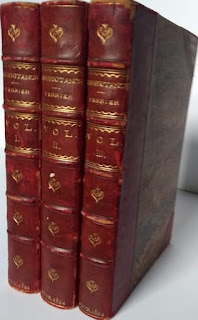Susan Ferrier's second novel was not published until six years after Marriage. Once again, it was anonymous. In April 1823, Susan's brother John visited John Murray to discuss producing The Inheritance. When William Blackwood heard of these early negotiations, however, he pleaded with Susan to give the work to him. His initial offer of £500 was refused, but, in September 1823, he paid her one thousand pounds sterling to be settled for by a bill at twelve months from the date of publication. The novel was published in the Spring of 1824 and it was an immediate success.
William Blackwood first edition - 1824
Readers and more professional critics were impressed. Walter Scott (according to Blackwood) spoke so much con amore and entered so completely, and at such length to me into the spirit of the book and of the characters, that showed me at once the impression it had made on him. Most readers believed that the author had grown considerably in her ability to structure a novel and develop characters. One wrote: 'Marriage' is a young book...'The Inheritance' a much maturer work, is well and carefully built. It shows the powers of Miss Ferrier at their fullest.
The intricacies of character drives the plot - the strong vein of selfishness in Mrs St. Clair; the passionate nature of Gertrude; the unpredictability of Uncle Adam; the opportunist and insensitive Mrs. Pratt; the tyrannical Lord Rossville; the comic unit that makes up the Black family - Bell, Lydia and Anne (although the latter is meant to be the ideal female figure, whom Gertrude will gradually learn from); the selfishness and vanity of Colonel Delmour; the vulgarity of Lewiston.
One interesting 'conflict' occurs between two moral themes: that children should be obedient to their parents and that one should live up to certain moral high standards. Mrs. St. Clair is unloving, grasping and vengeful; only slowly does Gertrude establish a clear and separate identity from her mother. There is still comedy to be found in Ferrier's second novel, but the concentration is more on orthodox moral concerns: the struggle between truth and deceit and the evil of vanity.
A few extracts:
Humour: Fortunately Miss Bell had no toilette duties to perform, for she was dressed for the Major in a fashionable gown made by Miss Skrimpskirt of Tattleton, from a pattern of Miss Gorewell's in Edinburgh, who got it from Miss Fleecewell of London, who had had hers direct from Madame Chefoeuvre of Paris...firmly relying on the justness of her proportions, and the orthodox length of her waist, and breadth of her shoulders, and strong in the consciousness of being flounced and hemmed up to the knees, she boldly entered, followed by her betrothed.
Miss Lilly blushed, and had no doubt that Mr Delmour was over head and ears in love with her already; and having read every novel in the circulating library at Barnford, Miss Lily was ready to be fallen in love with at a moment's warning.
Character: Mr Adam Black was a man of fair character, strong understanding, but particular temper, and unpleasing manners - with a good deal of penetration, which (as is too often the case) served no other purpose than to disgust him with his own species.
Colonel Delmour certainly was at no pains to gain the good graces of the family...and to have been at the trouble of making the agreeable to such a set of plebeians, would have required some very strong stimulus to one whose ruling principle was selfishness, and who never cared to please, unless to serve his own purpose...no views of beneficence or charity made any part of his scenes; his every idea centred in self-indulgence, and luxury and magnificence were all to which he looked as his recompense.
But it was in vain to hold this language to Lord Rossville; it was seldom an idea found entrance into his head, and when once there, it was no easy matter to dislodge it - it became, not the mere furniture of the head, to be turned or changed at will, but seemed actually to become a part of the head itself, which it required a sort of mental scalping or trepanning to remove.
I liked the one or two references to Scott - Mrs Black was chiefly emulous of a character for her dinners, and probably laboured infinitely harder to stuff a dozen dull bodies, than the Author of Waverley does to amuse the whole world. Moreover, Uncle Adam's world has a positive change once he has surreptitiously taken up Guy Mannering!
Touches of Jane Austen? It is universally allowed, that, though nothing can be more interesting in itself than the conversation of two lovers, yet nothing can be more insipid in detail - just as the heavenly fragrance of the rose becomes vapid and sickly under all the attempts made to retain and embody its exquisite odour.
A favourable passing comment about Methodism at last! But, as has been well said by the liberal-minded Wesley...
The occasional grumble? I found the repetition of Miss Bell's a person in my situation merely tiresome. Miss Pratt, I found more irritating than comic. I also felt the last few chapters bordered more obviously on the didactic, particularly when Lyndsay was holding forth - he trusted that the influence of Divine truth would bring peace to the soul... Some commentators have suggested that it was this moral 'preaching' which led to Ferrier's works going out of favour.
The convenient deaths of Mr Delmour, then Colonel Delmour (both inheritors of the Rossville title) who was injured and betrayed by a faithless wife...fought to avenge his honour, and fell in the cause, meant that Gertrude could live happily ever after with Lyndsay, the latest Lord Rossville. What a pity he appears to be rather a prig.


No comments:
Post a Comment